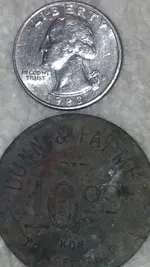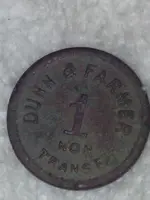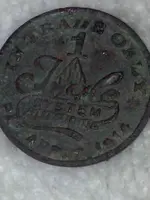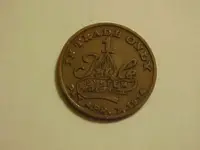You are using an out of date browser. It may not display this or other websites correctly.
You should upgrade or use an alternative browser.
You should upgrade or use an alternative browser.
trade coins
- Thread starter tsmith
- Start date
pong12211
Bronze Member
- Joined
- Jan 5, 2013
- Messages
- 2,487
- Reaction score
- 947
- Golden Thread
- 0
- Location
- North central Pa.
- Detector(s) used
- Garrett at pro/Garrett pro pointer
- Primary Interest:
- All Treasure Hunting
I have no idea what they are but I think they are cool finds either way..
Upvote
0
steelheadwill
Gold Member
- Joined
- Jan 2, 2010
- Messages
- 6,689
- Reaction score
- 716
- Golden Thread
- 1
- Location
- New Castle NH.
- 🥇 Banner finds
- 1
- Detector(s) used
- Brain eyes ears and nose
- Primary Interest:
- Other
one is an Ingle system, early 20th C trade/barter system, similar to Vonnothaus liberty dollar idea,
but not in precious metal. search for ingle tokens to ID yours.
but not in precious metal. search for ingle tokens to ID yours.
Upvote
0
idahotokens
Bronze Member
Terry--nice finds! The Ingle company, based in Dayton, OH, produced tokens as part of their "Ingle System" of bookkeeping for grocery and other types of stores. They marketed their "system" over much of the USA, but generally more tokens are known the closer you get to their headquarters. Grocery and general stores usually did two things that complicated their bookkeeping, and the Ingle System aimed to address each. First, stores often bought "butter & eggs" and other produce. The store could either pay cash or give store credit, and the stores usually gave a little more when paid in store credit than in cash - maybe 10% or so. The thought was that the farmer could easily take the cash to the competing store and spend it there, but store credit would insure return business. The second thing was that these stores often loaned money to their customers to help them out until payday or until the crops came in. Again, store credit was the easiest and most profitable to the store.
So, the Ingle Company made tokens for the stores, imprinted with the store name, in denominations from 1¢ to $10 or $20, and sold them along with accounting forms, etc. to stores. The stores could then purchase stuff with tokens and/or loan credits in the form of tokens. The tokens were only good at the store named on the token (although they did circulate to a small extent within the community since the barber needed groceries too). Every token lost or otherwise not redeemed was nearly pure profit to the store, and they got the benefit of the return business from their customers.
There are two basic series of Ingle tokens - 1909 and 1914-dated ones - but they were marketed for years after 1914. The problem that most Ingle tokens present today is that the location of the store is seldom shown on the tokens. That makes for a large research project to determine where "Dunn & Farmer" and thousands like them, were from. The late Lloyd Wagaman from Indiana spent countless hours poring over old business directories - he ultimately produced a 80 page booklet identifying many. Subsequently, researchers were able to obtain copies of a ledger the Ingle company used to track their shipments of tokens and other System supplies. It did a lot to correct errors in Wagaman's book, but there are still a lot of tokens where the business' location has yet to be proven.
Your finds fall in this latter category, but your having found two of them where you did will be a good help in researching them. I have contacted the current expert on Ingles to see if he has any info that will help. I'll post what he says. In the meantime, it would be great if you would post good closeups of each one on Richard's Token Database - TokenCatalog.com, or send them to me and I can do it.
Value That remains to be seen - a token attributed to a specific location is generally worth more than one that isn't. There are collectors of specific states who, for instance, would give a lot for a TN token but not for a KY token even though the TN token might be from right by the TN-KY state line.
That remains to be seen - a token attributed to a specific location is generally worth more than one that isn't. There are collectors of specific states who, for instance, would give a lot for a TN token but not for a KY token even though the TN token might be from right by the TN-KY state line.
John in the Great 208
So, the Ingle Company made tokens for the stores, imprinted with the store name, in denominations from 1¢ to $10 or $20, and sold them along with accounting forms, etc. to stores. The stores could then purchase stuff with tokens and/or loan credits in the form of tokens. The tokens were only good at the store named on the token (although they did circulate to a small extent within the community since the barber needed groceries too). Every token lost or otherwise not redeemed was nearly pure profit to the store, and they got the benefit of the return business from their customers.
There are two basic series of Ingle tokens - 1909 and 1914-dated ones - but they were marketed for years after 1914. The problem that most Ingle tokens present today is that the location of the store is seldom shown on the tokens. That makes for a large research project to determine where "Dunn & Farmer" and thousands like them, were from. The late Lloyd Wagaman from Indiana spent countless hours poring over old business directories - he ultimately produced a 80 page booklet identifying many. Subsequently, researchers were able to obtain copies of a ledger the Ingle company used to track their shipments of tokens and other System supplies. It did a lot to correct errors in Wagaman's book, but there are still a lot of tokens where the business' location has yet to be proven.
Your finds fall in this latter category, but your having found two of them where you did will be a good help in researching them. I have contacted the current expert on Ingles to see if he has any info that will help. I'll post what he says. In the meantime, it would be great if you would post good closeups of each one on Richard's Token Database - TokenCatalog.com, or send them to me and I can do it.
Value
 That remains to be seen - a token attributed to a specific location is generally worth more than one that isn't. There are collectors of specific states who, for instance, would give a lot for a TN token but not for a KY token even though the TN token might be from right by the TN-KY state line.
That remains to be seen - a token attributed to a specific location is generally worth more than one that isn't. There are collectors of specific states who, for instance, would give a lot for a TN token but not for a KY token even though the TN token might be from right by the TN-KY state line.John in the Great 208
Upvote
0
idahotokens
Bronze Member
Order #3477 from the Ingle Company was shipped to Cedar Hill, TN - with that bit of info, I can do some further looking to find them in a directory or the like. Was this anywhere near where you found them?
John in the Great 208
John in the Great 208
Upvote
0
daroofa
Hero Member
- Joined
- Apr 8, 2010
- Messages
- 574
- Reaction score
- 92
- Golden Thread
- 0
- Location
- Breckentucky MI
- Detector(s) used
- Garrett Ace 250
Upvote
0
idahotokens
Bronze Member
We're getting closer with this one! There was only one general store in Turnersville in 1914 and it was run by J. W. Dunn. At that time, there was no post office in Turnersville and it was on a rural route from Cedar Hill. Presumably that was still the case in about 1917 when the Dunn & Farmer tokens were shipped via the post office in Cedar Hill. My current theory was that J. W. Dunn took Farmer as a partner sometime between 1914 and 1917 and the tokens were ordered after that partnership formed. I've yet to identify what J. W. Dunn's first name was or who Farmer was, tho...
John in the Great 208
John in the Great 208
Upvote
0
Bigcypresshunter
Sapphire Member
- Joined
- Dec 15, 2004
- Messages
- 27,000
- Reaction score
- 3,340
- Golden Thread
- 0
- Location
- South Florida
- Detector(s) used
- 70's Whites TM Amphibian, HH Pulse, Ace 250
- Primary Interest:
- Beach & Shallow Water Hunting
As an eBay Associate we earn from qualifying purchases.
Upvote
0
Bigcypresshunter
Sapphire Member
- Joined
- Dec 15, 2004
- Messages
- 27,000
- Reaction score
- 3,340
- Golden Thread
- 0
- Location
- South Florida
- Detector(s) used
- 70's Whites TM Amphibian, HH Pulse, Ace 250
- Primary Interest:
- Beach & Shallow Water Hunting
Here are some other Ingle Scrip tokens found. token "april 7, 1914" - Google Search More on Ingle System Scrip. MORE ON INGLE SYSTEM SCRIP
Im trying to find the patent but Google patent search is not what it used to be.
Im trying to find the patent but Google patent search is not what it used to be.
Upvote
0
Similar threads
- Replies
- 12
- Views
- 330
Users who are viewing this thread
Total: 1 (members: 0, guests: 1)









